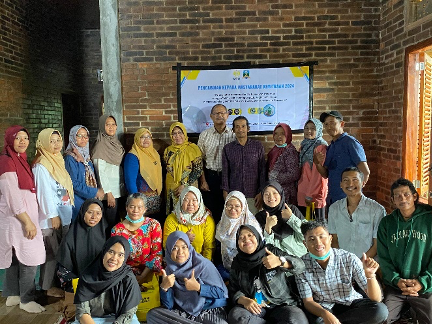Desa Ngesrepbalong Kecamatan Limbangan Kabupaten Kendal telah dicanangkan sebagai desa ekowisata dengan Surat Keputusan Bupati Kendal no. 556/343/2021. Untuk mendukung perwujudan desa ekowisata tersebut masyarakat setempat aktif melaksanakan kegiatan konservasi tanaman langka dari Gunung Ungaran, antara lain anggrek. Selama ini anggrek spesies alam yang dikonservasi sebanyak 26 jenis dan dipelihara di sebuah rumah kasa yang disebut Omah Anggrek. Untuk melengkapi Omah Anggrek, pada tahun 2023 Tim Pengabdian Masyarakat UNNES telah mengembangkan laboratorium kultur jaringan tanaman (KJT) skala sederhana agar para pegiat konservasi dapat melakukan perbanyakan anggrek dan tanaman lain secara efektif dan efisien. Perbanyakan dengan KJT membutuhkan keterampilan khusus yang belum dimiliki secara optimal oleh para pegiat konservasi. Oleh karena itu pada tahun 2024 ini Tim Pengabdian Masyarakat Rumpun Biologi FMIPA UNNES melaksanakan kegiatan pelatihan perbanyakan tanaman menggunakan teknik KJT tersebut bersumber dari Dokumen Pelaksanaan Anggaran (DPA) LPPM UNNES Tahun 2024 berdasar Surat Perjanjian Pelaksanaan Pengabdian Kepada Masyarakat Kemitraan nomor 686.26.2/UN37/PPK.10/2024.
Kegiatan pelatihan diikuti oleh 10 orang pegiat konservasi dari desa setempat mulai tanggal 2 Agustus 2024 dan dilaksanakan secara bertahap. Pelatihan resmi dibuka oleh Kepala Desa Ngesrepbalong, Bapak Riyono. Dalam sambutannya, beliau menyatakan bahwa ketrampilan melakukan teknik KJT di laboratorium skala sederhana tidak hanya berperan penting dalam pelestarian anggrek asli Gunung Ungaran, tetapi juga berpotensi untuk memperbanyak berbagai tanaman lain yang diminati masyarakat dan memiliki nilai ekonomi tinggi. Inisiatif ini diharapkan dapat mendukung program pengembangan wisata menuju desa ekowisata yang berkelanjutan.
Pelatihan diawali dengan pendalaman materi tentang karakteristik teknik KJT oleh ketua tim Prof. Dr. Enni Suwarsi Rahayu, M.Si; dilanjutkan diskusi dan tanya jawab tentang metode perbanyakan tanaman dengan KJT yang dipandu oleh Dr. Y. Ulung Anggraito, M.Si. Selanjutnya dilakukan diskusi dan praktek teknik sterilisasi ruang dan alat serta pembuatan media yang dipandu oleh Aida Raesa Amalia, S.Si. Tahap berikutnya adalah diskusi dan praktek subkultur dan inkubasi yang dipandu oleh mahasiswa peneliti KJT, yaitu Mirzalul Umam. Pada tahap ini peserta melakukan sub kultur atau pemindahan plantlet ke media baru.
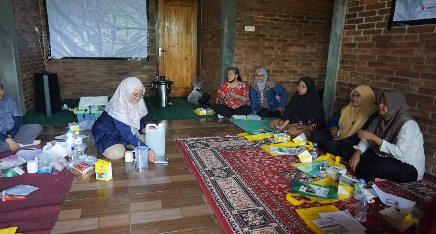
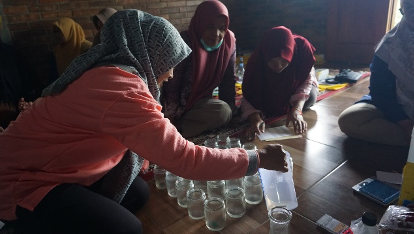
Gambar 1. Pelatihan membuat media KJT (gambar kiri) dan memasukkan media ke dalam botol kultur (kanan)
Setelah melakukan aktivitas di laboratorium, peserta pelatihan diajak diskusi dan praktek aklimatisasi di Omah Anggrek. Kegiatan ini dipandu oleh mahasiswa peneliti KJT yang lain, yaitu Fadhila Isnahardiyanti dan Khairunisa. Selanjutnya akan dilakukan monitoring hasil kegiatan dan pemecahan masalah yang ditemui yang akan dilakukan oleh Dr. Andin Irsadi, M.Si. dan Heppy Kristin Natalia.
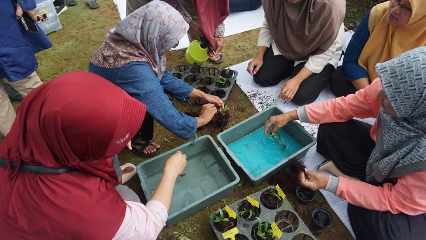
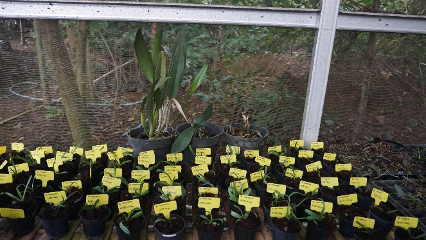
Gambar 2. Para peserta pelatihan antusias melakukan praktek aklimatisasi (gambar kiri) yang menghasilkan sejumlah plantlet ditanam di pot (gambar kanan)
Kegiatan ini mendapat respon positif dari koordinator pegiat konservasi Desa Ngesrepbalong, yaitu Mas Simon. Beliau mengapresiasi langkah progresif ini sebagai upaya memperkaya potensi wisata edukasi di Desa Ngesrepbalong. Antusiasme tinggi juga ditunjukkan oleh peserta pelatihan yang merasa bangga mendapatkan keterampilan baru dalam perbanyakan tanaman. Mereka berkomitmen untuk memanfaatkan fasilitas laboratorium dan ketrampilan yang dilatihkan dalam mendukung program pelestarian anggrek dan tanaman lain serta memperkuat daya tarik eduwisata dan ekowisata yang tengah dikembangkan di desa tersebut.
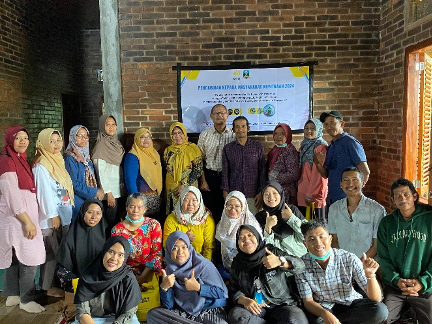
Gambar 3. Foto bersama pegiat konservasi Desa Ngesrepbalong dengan Tim Pengabdian Masyarakat Unnes di depan ruang laboratorium KJT Desa Ngesrepbalong


